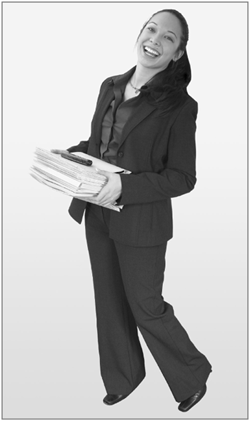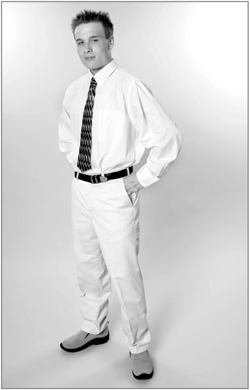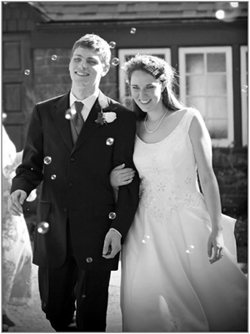
LESSON SIX
WHAT TO WEAR
TIPS FOR LOOKING YOUR BEST
Learning Objective
To develop the knowledge and expertise you need to give you confidence in the way you dress.
Introduction
Whether you are going on a date, to church, to a school function, or to a college entrance or job interview, the way you dress says a lot about you. A haphazard appearance gives the impression that you are untidy and even careless. The way you dress shows how much you respect yourself and others.
In this lesson, you will choose from your closet what you would wear to an interview with a college dean of admissions or for a job interview as an entry-level office worker. You will make a list of items you may need to replace, such as a new shirt or tie, what you need to polish or have cleaned and pressed.
You might go with a parent to a very nice clothing store to learn about dressing appropriately. You may also want to visit a formal shop to learn about formal wear in preparation for a prom or a banquet where “Black Tie” is indicated on the invitation.
As mentioned earlier, you make a first impression on others within a few seconds after you come into view, so the way you package yourself is important. You want people to remember you for your wonderful personality or your social skills and not for your unkempt or disheveled appearance. It is not about buying expensive clothes, but about purchasing well-chosen, quality clothing and accessories.
Studies show that job applicants who dress appropriately are paid higher starting salaries, and that improper attire is often the reason applicants are turned down for a job. When applying for a job, dress as closely as you can to the way the best-dressed person there dresses. Some experts say to dress for the job or position you would like to have.
You may incorrectly assume that if no one says anything negative about your appearance, you are appropriately dressed. The truth is that if anyone says anything to you about your appearance, the damage to your overall image may have already been done.
“Improper dress is the most common reason job candidates are eliminated.”
—John Molloy, Dress for Success
WHAT NOT TO WEAR
Here are some general dos and don'ts for job interviews, church attendance, and college entrance interviews. This list is not intended to be unjustly critical or a reflection on anyone's character. The items are simply inappropriate for college applicants, for the church sanctuary, and for job interviews. (One caveat: This list should not be used to exclude anyone from a church. It is for your personal use only.)
- the geeky or grunge look
- see-through blouses or dresses
- shirts or tops with an inappropriate message on them
- cutoff jeans or pants
- shorts
- strapless dresses
- bare midriffs
- jogging or “wind” suits
- platform-type shoes that make a slapping noise on a wooden floor
- clothing that is too tight
- clothes that drift downward from the waist
- sunglasses
- too many earrings or other jewelry (for girls); any jewelry for guys
- plunging necklines
- high heels that wobble and make the wearer tend to stumble
- mini-skirts
- a slip showing through the slits in a skirt
- lingerie-type clothing of any kind
- tight or unlined slacks that reveal the wearer's underpants
- chewing gum, toothpicks, candy, or drink
GROOMING
Tattoos cannot be removed easily, and they are highly discouraged. Good grooming and attention to detail are important. Even high-quality clothing is easily cheapened by neglect of daily grooming habits (showering, shaving, hairstyling, etc.) and proper hygiene, such as clean fingernails, nose, and ears.
“The critical factor in credibility is presenting the expected image.... Don't wear anything that will surprise the people you meet for a job interview.”
—John Molloy, Dress for Success
USEFUL TIPS FOR THE GUYS
- Your shoes should be well polished.
- Guys wearing a suit must wear nice loafers or leather, lace-up shoes—no canvas or athletic footwear.
- For interviews, a spotless white shirt is your best bet.
- The tip of your tie should reach the middle of the belt buckle, not above the buckle, nor below it.
- Ties should not be so loud (regardless of how beautiful) that you are remembered for the parrot or ducks on your tie rather than for your knowledge or expertise.
- Good suit colors for guys are navy, charcoal, dark brown, and gray.
- Your socks should be long enough to cover the calf of your leg when you sit and cross your legs, with no exposed skin between the sock and the cuff or hem of the trouser leg.
- Shirt collars should button comfortably when two fingers are inserted between the collar and the neck of the wearer.
- Suits for guys are a little more formal and business-like than slacks and a sport coat, which are fine if that is the only type outfit available to you.
- Conforming and dressing to suit the occasion may not always be the most comfortable choice, but doing so is definitely the wisest choice. You do not want your appearance to be a shock or a distraction.
TIPS FOR YOUNG WOMEN
For a job or college interview, a young lady should wear a dress, a jacket dress, or a conservative suit—no jeans or slacks. Her shoes should be flats or low heels with no patterned hosiery or stockings with runs or snags. A small handbag or small shoulder purse is appropriate. A big bag is not.
Here are common mistakes girls sometimes make:
- Wearing too many accessories (distracting from their true self)
- Wearing a skirt shorter than one inch above the knee
- Earrings that are too long or too large
- Chipped nail polish, or long “witch” or decorated fingernails
- Grooming in public
- Too much makeup
- Too much perfume
- Hair constantly falling in their face
- Continually flipping or pulling at their hair
- Wearing their hair down in their eyes, making it difficult to see them
- Wearing clothing inappropriate for the occasion

HOW TO SHOP
When shopping for appropriate clothes, always go first to an expensive store known for its quality and fit to learn what the best clothing looks like. Then when you shop in a store that better fits your budget, you will know what to buy. Better quality clothing usually costs a little more but looks better for a longer period of time.
First, determine your budget allowance. Then take inventory of your closet. Assess items that need to be updated or replaced—for instance, a new tie or a new white blouse. To simply go shopping with nothing particular in mind usually costs you unnecessarily and fills your closet with mismatches.
Making wise purchases makes your money go further, and it also reveals good stewardship of your resources. Here are some important questions to ask when shopping:
- What article in my closet will go with this item?
- Is it of good quality? (Check seams, hems, lining, zippers, buttons, etc.)
- Is this item on my “list of needs” or just an impulse purchase?
- What type of care will it require—for example, dry cleaning or hand washing?
- Will it need alterations? If so, can I afford them? (Alterations are usually worth the cost if they give a good article of clothing that perfect-fit look.)
- How long will this be in style? Are the lines traditional or faddish? When you are tempted to buy clothes that will be out of style next season, perhaps you should consider buying only one, if it is otherwise appropriate.
- How often can I wear this item in one season?
- What is the exchange or refund policy of this store?
FORMAL ATTIRE
There comes a time in every person's life when only formal attire will do. Perhaps you are going to a prom, a ceremony, an awards banquet, or a formal holiday party. Because these occasions are rare, it is a good idea to go to a good rental shop for your needs. Buying a tuxedo that you may only wear once and will likely outgrow may not be a wise purchase. When an invitation says “Black Tie,” that means a tuxedo for the guys and a floor-length formal gown for the girls. (The girls' invitation will have the same wording as the guys'). “Black Tie Optional” usually means that a dark business suit is appropriate for the guys, and a mid-calf (or “tea-length”) dress that is of soft, elegant fabric is a good choice for the girls. If you are unsure what the expectations are for the event, ask a knowledgeable adult.

